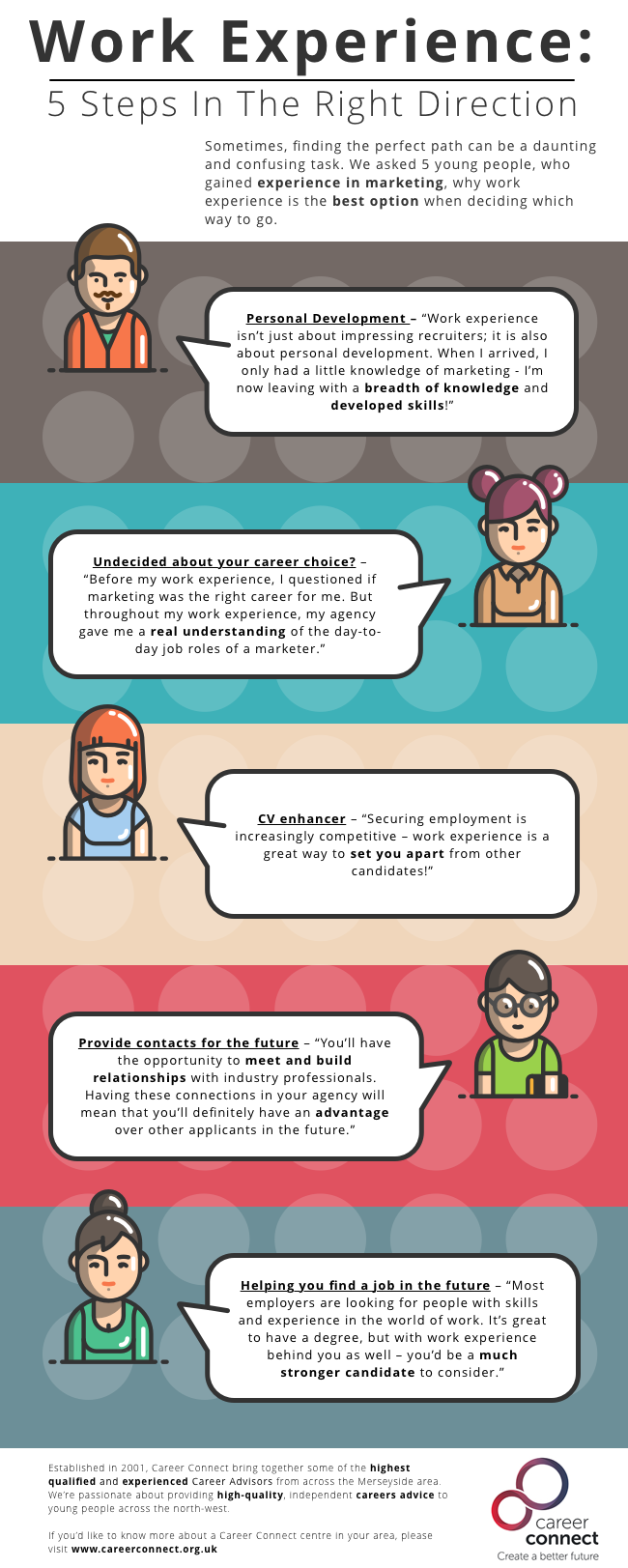![]()
Work Experience
Work experience is a chance for you to develop the skills required for the workplace.
Work Experience placements with employers can take many forms in that it can be one day a week over a fixed term; full attendance over one or two working weeks or extending over longer terms such a 3 months, 6months, 1 year or possibly more.If you are attending school, check to see if work experience is being organised by your school. Some schools have a work experience programme built in.
The common skills required for every workplace are similar to those you have used in school and were built into every lesson you attended. These are called Key Skills and translate into the following in the work place setting.

Work Experience may not always be appropriate to your career choice but it demonstrates to prospective employers that you are keen and willing to learn new skills.
It is often best to approach Work Experience with the view to developing the above skills rather than a way to develop experience for your career choice. The aforementioned skills are common to all workplaces. Also, a positive work experience can boost your motivation to gain future employment.
Regrettably, finding a work experience placement appropriate to your career choice may not always be possible and limited by a number of factors such as an employer’s willingness to provide a placement; lack of local industry appropriate to your career choice; Health and Safety considerations and age restrictions. Our experience tells us that it is easier to obtain Work Experience in a retail or office setting but harder for example, obtaining experience in a laboratory within the Chemical Industry.
However, this is not to say that obtaining a placement of your choice is not possible. If you have researched an industry or employer, obtained good exam grades and are able to demonstrate to an employer that you are serious about pursuing a career in that industry, then an employer may well be encouraged to gladly provide a work experience placement.
In addition, employers can be so impressed by their work experience employee that they sometimes offer a full time position. This, however, is dependent upon the employer being able to afford this – even if they really want to employ you!
The best view to take with Work Experience is that it will give you the skills for the workplace. Therefore when applying for jobs, (either through a CV, application form or telephone interview etc), outlining your work experience and the skills you have developed will place in you in a better position to convince employers that you have the ability to do the job!!
Don’t forget WORK EXPERIENCE is like putting money in the bank – it is an investment for your future!!!
| Key Skill | Translated to the Workplace |
|---|
| Working with others |
Teamwork and Customer Service |
| Improving own learning & performance |
Solving Problems & Learning from your mistakes |
| Application of number |
Accounts, storing, recording and using numerical information (statistics), using phone and fax numbers |
| Communication |
Listening, Expressing your point of view, Negotiating,
Persuading Others and Working with Customers |
| ICT |
Using computer packages such as Outlook, Word, Excel,
Access; mobile phones; digital cameras; data projectors |
Voluntary Work
Volunteering is “any activity that involves spending time, unpaid, doing something that aims to benefit the environment or someone other than, or in addition to, close relatives…volunteering must be a choice freely made by each individual. This can include formal activity as well as informal community participation.” If you do not find work immediately it is worth becoming a volunteer or enrolling on a personal development opportunity, as this will give you valuable work and life experience whilst you are looking for paid employment. You may get paid expenses, e.g. for travel to the venue.
Why Volunteer?
- You help others
- You make new friends
- You can explore a new career
- You have fun
- You build up your self confidence
- You improve your CV
- You put something back into your community
What Can You Do?
Many people think that volunteering is only done by retired people or adults with a lot of spare time. This is not true and there are many types of activities young can become involved with.
These include: environmental projects, conservation work, being a DJ, working with children, working with elderly people, youth work, retail work in shops etc., 
How Can I Get Involved?
There are many places to contact; you can work in your own area or in another part of the United Kingdom.
NB There are also opportunities abroad for certain things, there are normally age restrictions on these opportunities, you will need to be at least 18 years of age, in some cases older.
For more information a useful website is www.do-it.org.uk
Want to get in touch?
Please feel free to get in touch - we'll try to respond as quickly as possible.
* note: all fields are required.